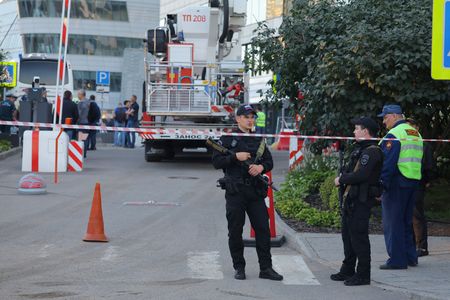 1
1 1
1
By Alexander Marrow
(Reuters) – Economic sanctions have been the biggest headache for Russia’s business elite since the start of the war in Ukraine, but two drone strikes in the heart of Moscow’s financial district are forcing companies to think about their employees’ safety.
An explosion early on Sunday rocked the Moskva-Citi business district, a few miles west of the Kremlin and home to several skyscrapers, in what Russia’s defence ministry said was a thwarted Ukrainian drone attack, the second in a week.
Early on Tuesday, an out of control drone hit the same high-rise building, damaging the facade on the 21st floor, according to Moscow Mayor Sergei Sobyanin.
Nobody was hurt in either incident and there was only minor damage, but such attacks are uncomfortable for the authorities who have told the public that Russia is in full control of what they call its “special military operation” in Ukraine.
After the first attack, tech giant Yandex, which has offices dotted around the Russian capital including in Moskva-Citi, asked staff to vacate offices at night, when strikes on the Russian capital have tended to occur.
“Taking into account the situation, we ask you not to be in the office at night (from 1 a.m. to 6 a.m.),” Yandex said in a message to employees. “The restriction applies to all Moscow offices. Take care!”
Yandex, which like many technology companies has relatively flexible working hours, declined a Reuters request for comment.
Many companies in Russia continue to allow employees to work in hybrid mode, split between home and the office, following the lockdowns imposed during the coronavirus pandemic.
Kremlin spokesman Dmitry Peskov said on Monday Ukrainian attacks on Moscow and other Russian targets were “acts of desperation” and that Russia was taking all measures possible to protect against strikes.
Kyiv typically does not claim responsibility for specific incidents on Russian territory, and did not claim Sunday’s attack, though President Volodymyr Zelenskiy said the war was “gradually returning to Russia’s territory – to its symbolic centres”.
Two drones reached the Kremlin in May, the most high-profile incident, but other attacks have targeted buildings near the defence ministry’s headquarters on the Moscow River and the capital’s exclusive Rublyovka suburb, home to much of Russia’s political, business and cultural elite.
‘REALLY SCARY’
Reuters spoke to several people, who asked not to be identified, in order to gauge the business community’s reaction to the first incident, with some expressing fear and concern, while others remained unfazed.
“I can say that for myself it has of course become more worrying for me and my colleagues,” said one person who works in Moskva-Citi. “Somewhere in the back of my mind it was always understood that Citi could be one of the targets.”
One employee at a company with an office in a Moskva-Citi skyscraper said working there felt “weird”, but that staff were not being sent to work remotely.
Another, who works for a bank, said most staff had been told to work from home.
Some said business was continuing as normal and that everything was calm.
One financial services professional said he did not think the attack would deter people from going to Moskva-Citi.
The attack damaged a building reported to house government offices. Reuters on Sunday saw glass panels blown out in one high-rise building and glass, debris and office documents littering part of the pavement below.
Video footage from the incident showed a bright orange explosion, accompanied by a deafening bang.
A Telegram channel run by the Russian online media group Mash broadcast photos of the damage done to the digital ministry’s headquarters.
Mash reported that the ministry’s staff had been asked to be resilient, but that most employees would be permitted to work from home temporarily.
The ministry did not respond to a request for comment.
For one employee at a large Russian company, the attack was a “really scary” warning.
“No one is safe, I’m afraid now.”
(Reporting by Reuters; Editing by Gareth Jones, Mark Potter and Michael Perry)